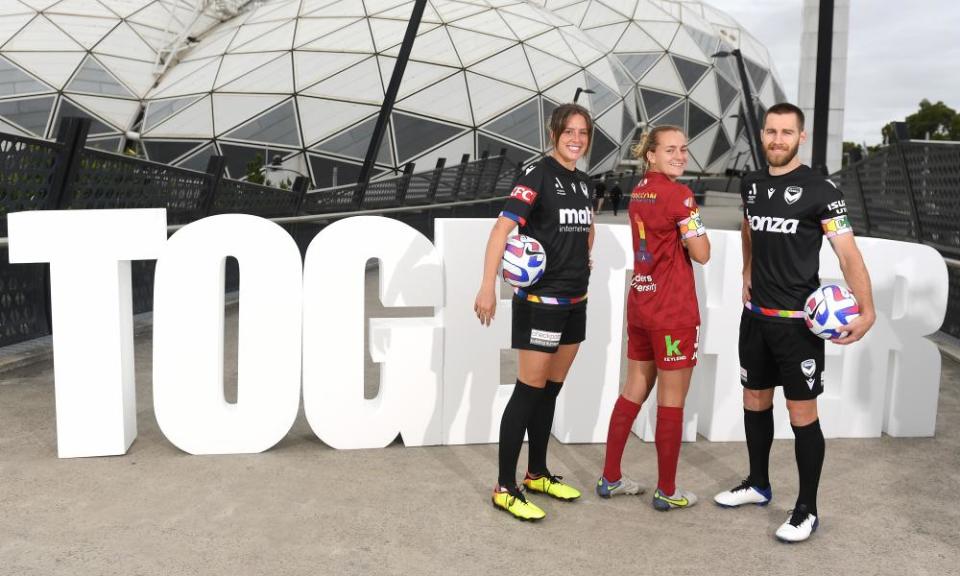‘Much bigger than a game’: A-Leagues’ Pride Cup seeks to drive change

Melbourne Victory and Adelaide United’s A-Leagues Pride Cup will serve as an important opportunity to drive change at both a professional and community level, its organisers have said.
The clubs’ men’s and women’s sides will meet at AAMI Park on 16 February, a year on from the league’s first iteration of the Pride Cup at Hindmarsh Stadium.
Related: Demand for tickets drives Matildas’ World Cup opener to 83,500-capacity Accor Stadium
According to Pride Cup CEO James Lolicato, whose organisation has partnered with the clubs to organise the fixture, only 6% of LGBTI+ young people are involved in a team sport. In his view, these games serve as an important opportunity to encourage welcoming and safe environments in a professional setting, and foster changes at a community level that will see increases in this figure.
“What’s really important is that players know the stats behind LGBTI+ inclusion,” he said. “They know why it’s important and they know what they can do to be the best allies possible.
“For those who are watching on for the very first time, but also for all the games following and for all the community events that they’re going to so they can be the voices of the [LGBTI+] community.”
Both Victory and Adelaide have commissioned special kits for the event, while Victory and Pride Cup will work together to stage a series of events promoting education, inclusion, and celebration of the LGBTI+ community. A “Victory Pride Village” will be erected on Gosche’s Paddock next to AAMI Park on matchday and it is expected that free tickets will be made available to the LGBTI+ community amongst further announcements in the lead into the event.
Beyond educational work that has been undertaken across all levels of Victory and Adelaide’s organisations for almost two years – ensuring buy-in and engagement from the two clubs – security and stadium staff at the venue will also receive training on inclusion and how how to create a safe environment for LGBTI+ attendees at both the Pride fixture and future games.
“With any round, it’s important that the announcement needs to be made at the right time, as well that the work needs to go on behind the scenes,” said Lolicato. “There needs to be that development process that is encouraged, so everybody understands why these games are important, why they’re needed and everybody can be on the same level playing field when going in.
“We encourage a Pride Cup [to have] 12 to 18 months of work that goes in behind the scenes. So players, committees, boards, as well as operation teams, all understand why this game exists. And they’re going in for the right reasons with the right mindset and ready to really help the LGBTI community feel more and more engaged in sports when they need it most.”
Melbourne United centre Isaac Humphries came out as the NBL’s first openly gay player in November, and the league recently staged basketball’s first pride round, which despite its success was overshadowed by the Cairns Taipans’s decision to opt out of wearing jerseys with a rainbow decal to mark the event.
Humphries told ESPN he was “disappointed” with the events, sentiments echoed by Adelaide’s Josh Cavallo, who became the only openly gay active male top-flight footballer in the world when he came out in October 2021.
“It is disappointing. I know and I’m prepared that we’re going to come across that,” he said. “In the A-Leagues, it’s phenomenal because everyone got around [2021-22’s Pride Cup].
“If we do something special as we’re doing in the A-Leagues and continue to grow that, I think leagues like basketball we’ll see the difference and the effect that’s happening not only in their sporting game but around the world and around Australia.
“For me, this is much bigger than a game. This is people’s lives we’re talking about and if we can help affect it in a better way then why wouldn’t we?”
Reports have indicated that the Australian Professional Leagues, the A-Leagues’ administrators, were seeking to stage a full Pride Round to coincide with Victory and Adelaide’s fixture.

 Yahoo Sport
Yahoo Sport 




































































